Related Research Articles

The American Physical Society (APS) is a not-for-profit membership organization of professionals in physics and related disciplines, comprising nearly fifty divisions, sections, and other units. Its mission is the advancement and diffusion of knowledge of physics. The society publishes more than a dozen scientific journals, including the prestigious Physical Review and Physical Review Letters, and organizes more than twenty science meetings each year. APS is a member society of the American Institute of Physics. Since January 2021 the organization has been led by chief executive officer Jonathan Bagger.
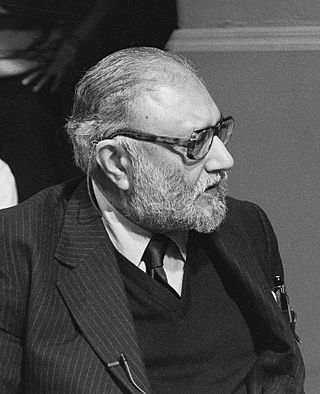
Mohammad Abdus Salam was a Pakistani theoretical physicist. He shared the 1979 Nobel Prize in Physics with Sheldon Glashow and Steven Weinberg for his contribution to the electroweak unification theory. He was the first Pakistani and the first Muslim from an Islamic country to receive a Nobel Prize in science and the second from an Islamic country to receive any Nobel Prize, after Anwar Sadat of Egypt.

The Government College University is a public research university in Lahore, Punjab, Pakistan. GCU is ranked among the most prestigious academic institutions in Pakistan. Founded as Government College, Lahore, in 1864 under British administration, it became a university in year 2002.
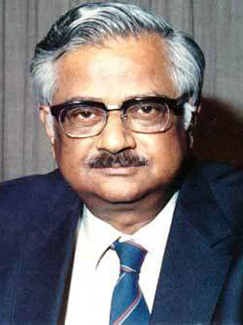
Raja Ramanna was an Indian physicist who is best known for his role in India's nuclear program during its early stages.

Pakistan Atomic Energy Commission (PAEC) is a federally funded independent governmental agency, concerned with research and development of nuclear power, promotion of nuclear science, energy conservation and the peaceful usage of nuclear technology.

The Abdus Salam International Centre for Theoretical Physics (ICTP) is a research center for physical and mathematical sciences, located in Trieste, Friuli-Venezia Giulia, Italy.

The Pakistan Institute of Nuclear Science & Technology (PINSTECH) is a federally funded research and development laboratory in Nilore, Islamabad, Pakistan.

Ishfaq Ahmad KhanSI, HI, NI, FPAS, was a Pakistani nuclear physicist, emeritus professor of high-energy physics at the National Centre for Physics, and former science advisor to the Government of Pakistan.
Abdullah Sadiq, is a Pakistani physicist and ICTP laureate who received the ICTP Prize in the honour of Nikolay Bogolyubov, in the fields of mathematics and solid state physics in 1987 for his contributions to scientific knowledge in the field of mathematics and statistical physics. He is the professor of physics and current dean of the department of physics of the Air University of the Pakistan Air Force (PAF).

Obninsk Institute for Nuclear Power Engineering is an institution of higher education located in Obninsk. It began as a branch of the Moscow Engineering and Physics Institute in 1953 to provide specialists in the field of nuclear physics, reactor physics and reactor engineering for the Soviet Union's growing nuclear industry. The education was provided in close cooperation with nuclear-related research institutions in Obninsk.
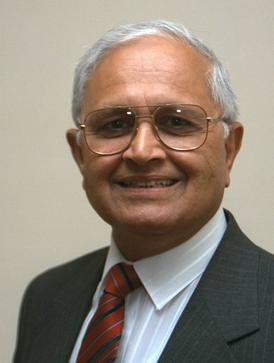
Munir Ahmad Khan, NI, HI, FPAS, was a Pakistani nuclear reactor physicist who is credited, among others, with being the "father of the atomic bomb program" of Pakistan for their leading role in developing their nation's nuclear weapons during the successive years after the war with India in 1971.

Riazuddin, also spelled as Riaz-Ud-Din, was a Pakistani theoretical physicist, specialising in high-energy physics and nuclear physics. Starting his scientific research in physics in 1958, Riazuddin was considered one of the early pioneers of Pakistan's nuclear weapons development and atomic deterrence development. He was the director of the Theoretical Physics Group (TPG) of the Pakistan Atomic Energy Commission (PAEC) from 1974 until 1984. Riazuddin was a pupil of the winner of the 1979 Nobel Prize in Physics, Abdus Salam.
Noor Muhammad Butt ; b. 3 June 1936), SI, FPAS, also known as N. M. Butt, is a Pakistani nuclear physicist and professor of physics at the Preston University who is known for his research publications in understanding the gamma-rays burst, Mössbauer effect, diffraction, later the nanotechnology.

The National Centre for Physics is a federally-funded research institute and national laboratory co-located near Quaid-i-Azam University.
The Chinese Nuclear Society is a non-profit organization representing individuals contributing to and supporting nuclear science, nuclear technology and nuclear engineering in China.
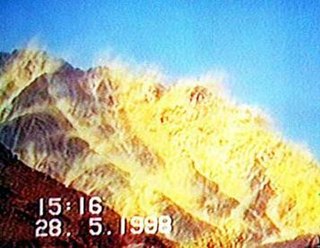
Project-706, also known as Project-786 was the codename of a research and development program to develop Pakistan's first nuclear weapons. The program was initiated by Prime Minister Zulfiqar Ali Bhutto in 1974 in response to the Indian nuclear tests conducted in May 1974. During the course of this program, Pakistani nuclear scientists and engineers developed the requisite nuclear infrastructure and gained expertise in the extraction, refining, processing and handling of fissile material with the ultimate goal of designing a nuclear device. These objectives were achieved by the early 1980s with the first successful cold test of a Pakistani nuclear device in 1983. The two institutions responsible for the execution of the program were the Pakistan Atomic Energy Commission and the Kahuta Research Laboratories, led by Munir Ahmed Khan and Abdul Qadeer Khan respectively. In 1976 an organization called Special Development Works (SDW) was created within the Pakistan Army, directly under the Chief of the Army Staff (Pakistan) (COAS). This organization worked closely with PAEC and KRL to secretly prepare the nuclear test sites in Baluchistan and other required civil infrastructure.
The International Nathiagali Summer College on Physics and Contemporary Needs (INSC), was founded by Nobel laureate in Physics Dr. Abdus Salam (then-Science Advisor to the Prime minister) to promote physics and scientific research activities in Pakistan. Having suggested by Professor Abdus Salam to the Government of Pakistan, it was established by the Pakistan Atomic Energy Commission's chairman Mr. Munir Ahmad Khan.
Naeem Ahmad Khan, FPAS, was a Pakistani nuclear physicist and a professor of physics who was known for his work in developing techniques using the solid-state nuclear track detector and solid-state nuclear magnetic resonance. Although he worked with the Government of Pakistan for most of his career, he also taught physics at a number of Pakistani universities and was the civilian scientist of the Pakistan Air Force (PAF) until his death.
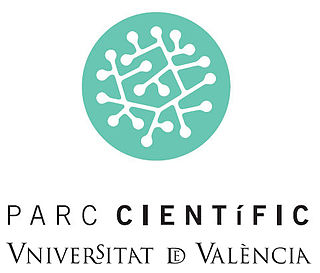
The University of Valencia Science Park provides spaces and services to companies resulting from university research, –spin-off–, and other companies and R & D departments with content related to the innovative nature of the PCUV.
Kamaluddin Ahmed, FPAS, was a Pakistani particle physicist and a professor of physics at the Quaid-e-Azam University.
